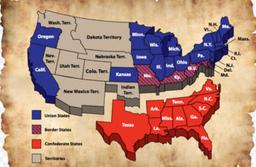
Unit 4 Final Assessment: Antebellum America & Divisive Events
Quiz by Scott Philipp
Feel free to use or edit a copy
includes Teacher and Student dashboards
Measure skillsfrom any curriculum
Tag the questions with any skills you have. Your dashboard will track each student's mastery of each skill.
- edit the questions
- save a copy for later
- start a class game
- automatically assign follow-up activities based on students’ scores
- assign as homework
- share a link with colleagues
- print as a bubble sheet
- Q1
The Fugitive Slave Act of 1850 required that ___.
escaped slaves be given their freedom if they made it across a state's boundary
slave catchers be given a reward for their services
anyone helping an escaped slave be fined or imprisoned
escaped slaves be transported to Canada
60s - Q2
What was the main reason Stephen A. Douglas wanted Kansas and Nebraska organized into territories?
He wanted to make it easier to build a transcontinental railroad.
He wanted to stop the spread of slavery.
He planned to increase the spread slavery.
He desired to add additional states to the Union.
60s - Q3
Kansas was called “Bleeding Kansas” because ____.
of conflicts between settlers and the U.S. Army
of violent conflicts between pro-slavery and anti-slavery settlers in the territory
of riots caused by legislators making unfair laws for the area
of continued violence between settlers and Native Americans
60s - Q4
People who worked to end slavery, even by breaking laws, were called ___.
abolitionists
transcendentalists
democrats
know-nothings
60s - Q5
Which of the following statements is not true about the Republican Party?
The Republican Party was formed in response to the Kansas-Nebraska Act.
The Republican Party's first presidential winner was elected in 1860.
The Republican Party's members wanted to keep slavery out of the western territories.
The Republican Party was the first political party ever formed in the United States.
60s - Q6
The Compromise of 1850 appealed to the southern states by ___.
allowing new territories to decide the slavery issue through popular sovereignty, and adopting a stricter Fugitive Slave Law
admitting Texas as a free state, and adding West Virginia as a slave state
allowing runaway slaves to move to Canada
admitting California as a free state, and banning the slave trade in the District of Columbia
60s - Q7
Which of the following happened after Abraham Lincoln was elected president?
The Utah Territory and New Mexico Territory were created from the Mexican Cession lands.
The Supreme Court announced the Dred Scott Decision.
The state of South Carolina withdrew from the United States.
Congress passed the Missouri Compromise.
60s - Q8
Which one of the following upheld slaveholders’ rights to their property anywhere in the United States?
The Wilmot Proviso
The Dred Scott Decision
The Compromise of 1850
The Kansas-Nebraska Act
60s - Q9
Under the terms of the Wilmot Proviso, if it would have passed the Senate, slavery would have been banned in ___.
Oregon
the territories gained from Mexico
Missouri
all southern states
60s - Q10
Uncle Tom’s Cabin, the conflicts leading to “Bleeding Kansas,” and the raid on Harpers Ferry all led to ___.
compromises between the Northern and Southern states.
a wider acceptance of slavery by most Americans
a greater involvement by African-Americans in the United States government
increased hostility between the Northern and Southern states.
60s - Q11
Most southerners argued that secession of states from the Union was legal because of ___.
the Declaration of Independence
states' rights
the First Amendment to the Constitution
popular sovereignty
60s - Q12
Which one of the following was not a well-known abolitionist?
Henry David Thoreau
Stephen A. Douglas
Harriet Beecher Stowe
Frederick Douglass
60s - Q13
What was the outcome of the senate election of 1858 between Abraham Lincoln and Stephen A. Douglas?
Douglas lost the election, but gained support throughout the country.
Lincoln won the election and national prominence.
Lincoln lost the election, and no longer participated in politics.
Douglas won the election, but lost northern support.
60s - Q14
As part of the Compromise of 1850 which of these was no longer permitted in the District of Columbia?
purchasing Native American lands
voting by African Americans and women
the practice of slavery
buying and selling of slaves
60s - Q15
Which of the following explains the purpose of John Brown’s raid on Harpers Ferry?
He wanted to intimidate abolitionists and runaway slaves.
He wanted to overthrow the U.S. government.
He wanted to punish the politicians of America.
He wanted to start a slave uprising throughout the South.
60s